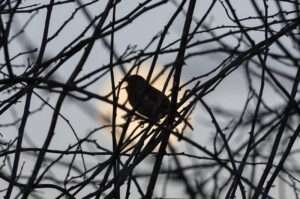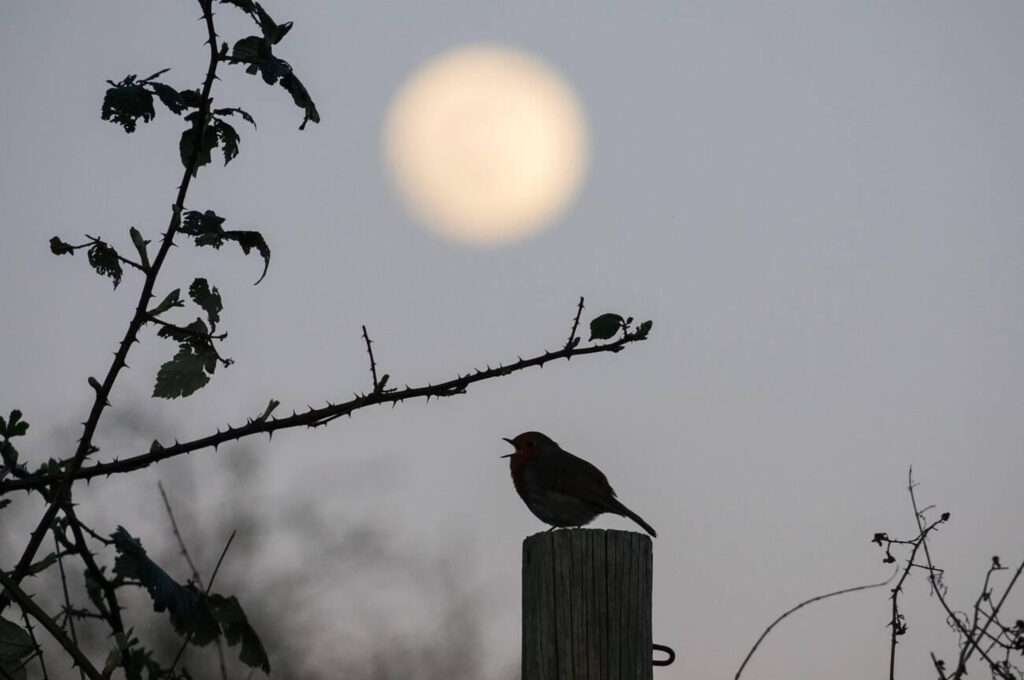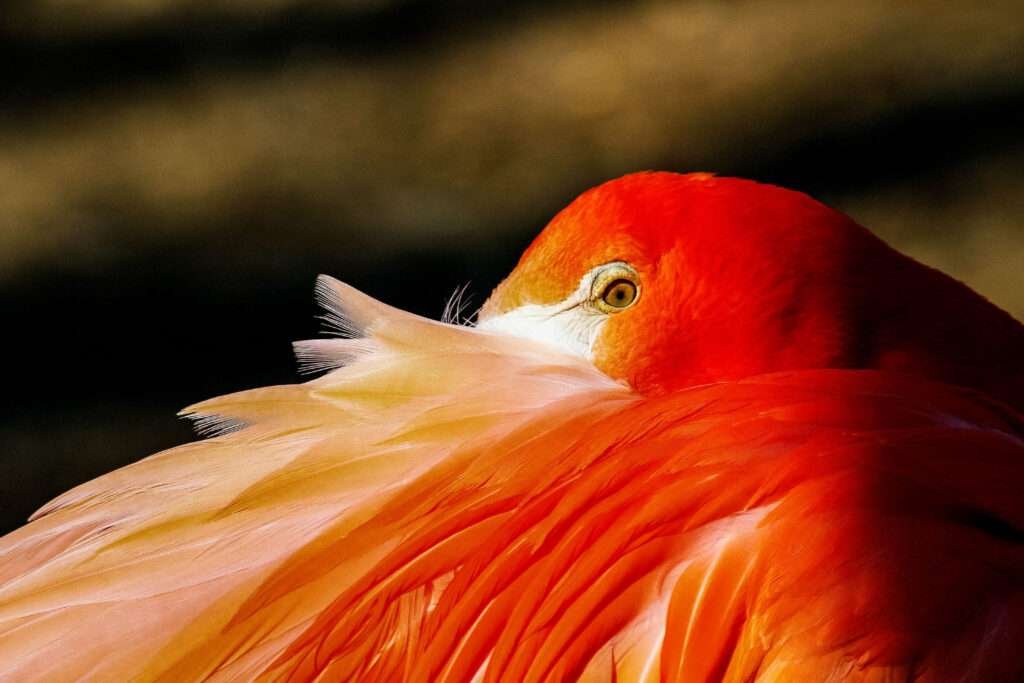Birds chirp at night for reasons like communication and attracting mates. Some species also chirp to claim territory.
Birds chirping at night can be a perplexing phenomenon for many. It’s a behaviour observed in a select few avian species. These nightly vocalizations serve various purposes, including mate attraction, territorial defence, and signalling a state of alertness. Urban birds, in particular, may chirp at night due to the bright city lights, which can disrupt their natural cycles.
During the breeding season, the desire to mate also prompts male birds to sing at night, ensuring their calls stand out without the daytime chorus. Such behavior is often associated with nocturnal or crepuscular birds like nightingales and owls, but can also be exhibited by diurnal birds disturbed by their environment. Understanding these vocal patterns is crucial for bird enthusiasts and researchers alike, providing insights into the complex lives of our feathered neighbours.
The Nocturnal Serenade
Nighttime holds a secret symphony. Birds chirp as stars twinkle above. This melodic mystery enchants the quiet darkness. Let’s uncover why these feathered friends sing after sundown.
Varieties Of Nighttime Vocalists
Birds that chirp at night are special. They are the night’s musicians. Not all birds sing in the dark. Here are a few:
- Owls: Known for their “hoots” which echo at night.
- Nightjars: Their music fills the air as dusk falls.
- Mockingbirds: These artists mimic sounds even under the moon.
Each bird has a unique tune. These tunes fill the night with life.

Evolutionary Reasons For Nighttime Chirping
Why do birds chirp at night? The reasons are deep-rooted. Here’s a simple breakdown:
| Reason | Explanation |
|---|---|
| Mating Calls | Songs attract mates. The night offers a quiet stage. |
| Marking Territory | Chirps tell others “This place is mine”. |
| Staying Safe | Chirping can warn friends of danger. |
These chirps evolved over time. Birds adapted to nightlife and found new ways to survive and thrive.
Decoding The Nighttime Chorus
When the sun sets, a mysterious symphony begins. Birds, known for their daylight melodies, continue to vocalize well into the night. This nightly performance puzzles many but serves vital purposes. Understanding why birds chirp at night can deepen our appreciation for these feathered friends.
Communicating In Darkness
Birds use sound to convey messages after dark. Since sight becomes less effective, chirps and calls become their primary communication tool. Nighttime chirping may signal various needs or behaviours:
- Claiming territory: Birds assert their space through distinctive calls.
- Finding mates: Some species sing to attract partners.
- Alarming others: Sharp chirps may warn of potential dangers.
The Role Of Moonlight
Moonlit nights offer unique conditions for birds. Moonlight enhances visibility, aiding in nocturnal activities. This may influence birds to chirp for several reasons:
| Moon Phase | Chirping Behavior |
|---|---|
| Full Moon | Higher visibility may lead to increased communication. |
| New Moon | Dimmer nights may result in more cautious chirping. |
Regardless of the phase, moonlight plays a crucial role in the nocturnal life of birds.
Territorial Calls After Dark
Territorial Calls After Dark are common among various bird species. Birds often use nighttime to communicate their territorial boundaries, ensuring they maintain control over their chosen environment even when most creatures are resting.
Marking Nocturnal Boundaries
Birds like the Northern Mockingbird or the Eastern Whip-poor-will are active at night. They chirp loudly to mark their space, preventing other birds from entering their territory while less visible.
- Northern Mockingbirds repeat their songs to assert dominance.
- Eastern Whip-poor-wills use long, continuous calls to cover larger areas.
Nightly Rivalries In The Treetops
Birds compete fiercely for nesting spots and food sources. Nighttime calls serve as a warning to rival birds, declaring that the area is already occupied.
| Bird Species | Type of Call | Purpose |
|---|---|---|
| Owls | Low-pitched hoots | Defend hunting grounds |
| Nightjars | Churring sequences | Maintain feeding territories |
These nocturnal vocalizations help maintain order and safety among bird populations, ensuring their survival and reproduction.
Mating Calls: The Quest For A Partner
As twilight fades, the night doesn’t just belong to stars. It’s also the stage for a unique avian symphony. Birds chirp at night not just to communicate, but to find love. This section of our post explores birds’ nocturnal melodies to attract mates.
Nocturnal Courtship Strategies
While most birds sing at dawn, some prefer the quiet of night for their courtship rituals. These night singers use the darkness to their advantage, making their calls more noticeable as most of the world sleeps. Here’s how they do it:
- Amplified Acoustics: Nighttime’s stillness allows songs to travel further.
- Less Competition: Fewer birds call at night, so individual chirps stand out more.
- Daytime Camouflage: Birds that are less visible during the day use the night to be heard.
Songs Of Seduction Under The Stars
Songs in the night sky are not just beautiful sounds but powerful tools for attraction. Each chirp and whistle is a bird saying, “Choose me”. Discover their seductive serenades:
| Bird Species | Type of Call | Purpose |
|---|---|---|
| Owls | Deep Hoots | Establish Territory & Attract Mates |
| Nightjars | Whistles & Trills | Attract Females for Mating |
| Mockingbirds | Variety of Tunes | Show Off Vocal Skills to Potential Partners |
Every chirp is a chance to find a partner. Under cover of night, birds engage in a complex dance of acoustic allure, each hoping to be the one that stands out in the darkness.
Disturbances In The Night
Many wonder why birds chirp at night. The truth lies in the Disturbances in the Night. Birds react to what happens in their environment. This section explores two main causes of nocturnal bird songs.
Human Activity And Its Impact
Birds are sensitive to changes around them. Light pollution from cities can trick them into thinking it’s daytime. Here’s how human activity affects these creatures:
- Lights: Bright lights from buildings and streetlamps.
- Noise: Traffic or music can cause stress.
- Buildings: Skyscrapers alter flight paths and habitats.
These factors lead to birds chirping at odd hours, often leaving us puzzled and in awe of their nighttime symphonies.
Predator Presence And Alarm Calls
Another reason for nocturnal chirps is predator presence. Birds use calls to:
- Warn others of danger.
- Scare predators away.
- Communicate with their flock.
These alarm calls serve as a defence mechanism, keeping the flock safe even when predators lurk in the darkness.
Birds That Break The Silence
When the world quiets down as the sun sets, not all birds go to sleep. Some birds are nighttime songsters, filling the darkness with their unique calls. These fascinating creatures adapt to life in the shadows. Let’s discover some nocturnal vocalists and understand why they chirp at night.
Owls And Nightjars: Masters Of The Dark
Owls, with their haunting hoots, are the iconic birds of the night. They use their calls to communicate and hunt in the dark. Different owl species have distinct calls, from deep hoots to high-pitched screeches.
- Great Horned Owl: Known for its deep hooting sequence.
- Barn Owl: Recognized by its eerie shriek.
Nightjars, like the Common Nighthawk, are less known but equally mesmerizing. Their chirps and buzzes add to the night’s mystique.
- Whip-poor-will: Named after its continuous, whistling calls.
- Common Nighthawk: Identified by its booming calls during flight.
Sporadic Chirpers: Oddities In The Avian World
Aside from the usual suspects, some birds sporadically chirp at night. This might be due to disturbances, light pollution, or changes in weather patterns. Here are a few examples:
- Northern Mockingbird: Known for mimicking other birds’ songs, even at night.
- Black-crowned Night Heron: Occasionally emits loud squawks after dark.
These sporadic chirpers break the silence of the night, each with a reason unique to their species.
The Science Of Studying Nocturnal Birds
The Science of Studying Nocturnal Birds dives into the mysteries of why birds chirp at night. It’s a curious behaviour, fascinating birdwatchers and scientists alike. As the sun sets, certain birds burst into song. To understand these twilight serenades, researchers employ various techniques. They work tirelessly to unlock the secrets held by the night sky.
Techniques In Nocturnal Ornithology
Bird researchers use several methods to study nocturnal birds. Each technique helps them gather data on bird activities after dark. These include:
- Mist Netting: Catching birds using fine nets for observation.
- Radio Telemetry: Tracking bird movements with small radio transmitters.
- Night Vision Equipment: Observing birds in their natural habitat without disturbance.
- Audio Recording: Capturing bird calls to analyze their frequency and patterns.
Advancements In Avian Acoustic Monitoring
Acoustic monitoring has transformed how researchers study birds at night. This technique involves:
- Using sensitive microphones to record bird calls.
- Analyzing recordings with specialized software to identify species.
- Creating a database of bird sounds for comparison and study.
Recent advancements in this field now allow for automated species identification. This saves countless hours of manual analysis and provides more accurate data. Sound libraries are growing, giving scientists a richer understanding of nocturnal bird life.
Conservation And The Nighttime Symphony
Many birds sing at night, creating a beautiful symphony. This occurs mainly due to their natural behaviours and environmental needs. Understanding and supporting these nighttime melodies involves conservation efforts and fostering a balance between human activities and bird habitats.
Protecting Nocturnal Habitats
Preserving the natural habitats of nocturnal birds is crucial. These areas provide the safety and resources they need to thrive. Here are key actions to protect these environments:
- Maintain dark skies by reducing light pollution.
- Preserve old forests and natural landscapes.
- Support policies that protect wildlife areas.
These steps help ensure birds have a safe place to live and sing at night.
Fostering Human-bird Harmony
Creating a balance where humans and nocturnal birds coexist peacefully is essential. Consider these strategies:
- Use bird-friendly outdoor lighting.
- Plant native trees and shrubs to provide natural shelters.
- Educate communities about the importance of nocturnal birds.
These efforts foster an environment where birds can thrive, even in urban settings, and continue their nighttime songs.
By protecting nocturnal habitats and promoting harmony, we ensure the survival of these nighttime symphonies for future generations to enjoy.
Frequently Asked Questions
Why Is A Bird Chirping At 3 am?
A bird may chirp at 3 am due to early dawn light, urban lighting, or internal circadian rhythms signalling the start of their daily activities.
What Kind Of Bird Chirps At Night?
Several bird species, such as nightjars, owls, and mockingbirds, are known for chirping at night. These nocturnal birds often use calls to communicate and hunt in the darkness.
How Do You Stop Birds From Chirping At Night?
To stop birds from chirping at night, eliminate light sources and reduce noise around your home. Provide natural bird deterrents, like decoy predators. Ensure windows are covered to block indoor lights. Use white noise machines to mask the chirping sounds for a peaceful sleep.
What Does It Mean When Birds Are Chirping Like Crazy?
Birds chirping intensely often signal communication, such as warnings of danger, establishing territory, or attracting mates. It can also indicate high activity levels during dawn and dusk, known as the dawn chorus.
Conclusion
Understanding the reasons behind nocturnal bird chirping enriches our appreciation of nature’s complexities. It’s a blend of communication, survival, and instinct. Recognizing these night songs connects us more deeply with the avian world. Let’s preserve their habitats, ensuring these mysterious melodies grace the darkness.




